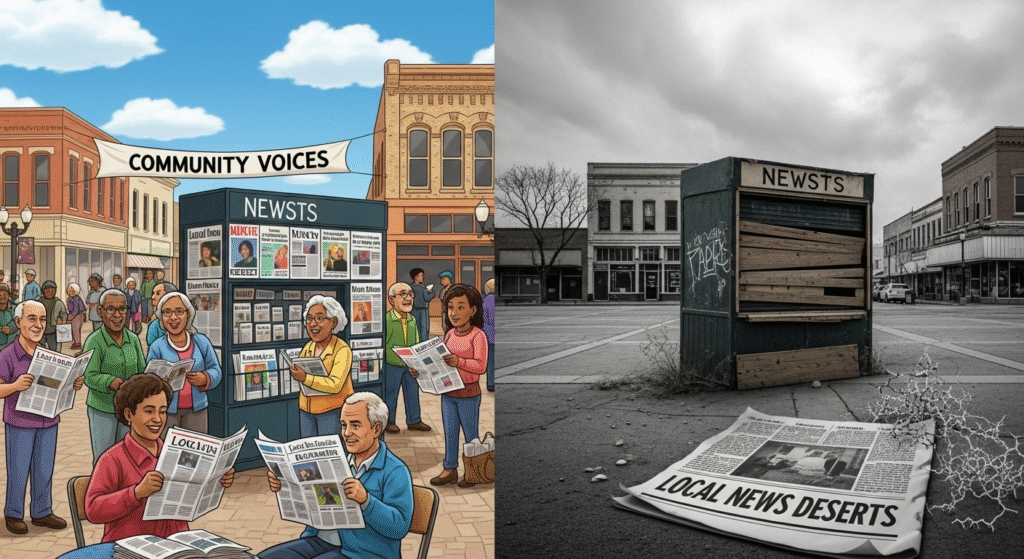Ever feel like you’re missing something? Like a crucial piece of the puzzle that helps you understand what’s really going on in your town? That gnawing feeling might be more than just paranoia; it could be the creeping effect of a local news desert.
I remember a few years back when the local paper in my hometown – the one that had been around since, like, forever – just up and closed shop. Poof. Gone. At first, it wasn’t a big deal. We had Facebook groups, right? And the nightly news. But then slowly, subtly, things started to…fray. Fewer people showed up to town hall meetings. Rumors flew around about the new development project that were totally unfounded. And it felt like everyone was arguing all the time. Coincidence? I don’t think so.
The truth is, when local news disappears, a lot more than just headlines goes with it. It’s like pulling a vital thread from the fabric of a community. And that thread is democracy itself.
The Alarming Spread of Local News Deserts

Okay, so what is a news desert, exactly? Simply put, it’s a community – often rural or underserved – that lacks access to reliable, comprehensive local news coverage. This can be because the local newspaper folded (like mine did), the radio station only plays syndicated content, or the TV station is based hours away and only focuses on the big city. Wikipedia has a pretty solid overview if you want a more formal definition. It’s a bigger problem than you might think.
But it’s not just about the physical absence of news outlets. It’s about the capacity of those outlets to do actual reporting. Are they just republishing press releases? Are they investigating local issues? Are they holding elected officials accountable? A lot of the “local news” you see online these days is… well, let’s just say it’s not exactly Pulitzer-Prize winning material.
The frustrating thing about this is that the internet was supposed to solve this problem, not make it worse. Remember the early days of blogging? Everyone thought citizen journalism would save the day. And while there are definitely some amazing examples of that, the reality is that it’s hard to compete with the scale and resources of established (or at least, used to be established) news organizations. Plus, let’s be honest, sorting through all the misinformation and biased takes online is a full-time job in itself.
Why Local News Matters More Than You Think
So, why should we care if the local paper is gone? I mean, we have the internet, right? We can get news from anywhere! Actually, that’s not quite right. While we can access news from anywhere, local news provides something unique and essential: a focus on the issues that directly affect our daily lives. Think about it this way: the national news might tell you about a new tax law, but the local news will tell you how that law will impact your property taxes. It’s about context, relevance, and, frankly, accountability. It’s about knowing who’s making decisions that affect you and having a way to hold them responsible.
And that’s where the “democracy” part comes in. A well-informed citizenry is crucial for a functioning democracy. If people don’t know what’s going on in their community – who’s running for office, what the local government is doing, how their tax dollars are being spent – they can’t make informed decisions at the ballot box. This lack of information can lead to apathy, disengagement, and, ultimately, a decline in civic participation. See? It’s all connected.
Moreover, local news often serves as a watchdog, keeping an eye on local government and businesses. When there’s no one to hold them accountable, corruption and mismanagement can flourish. Think about it: who’s going to investigate that shady land deal if the local paper isn’t around to ask the tough questions? It might be that breaking news is actually related to Local community celebrates record-breaking charity drive
The Impact on Communities: More Than Just News
Beyond the political implications, the loss of local news can have a significant impact on a community’s social fabric. Local news outlets often serve as a gathering place for the community, a place where people can learn about their neighbors, celebrate local achievements, and share their stories. They can promote local businesses, highlight community events, and foster a sense of belonging. In the absence of local news, these connections can weaken, leading to increased social isolation and a decline in community cohesion.
Consider this: local sports coverage. Sure, the national leagues are exciting, but what about the high school football team? Or the local little league? These are the stories that bind a community together, that give kids something to aspire to, that create a sense of shared identity. When those stories disappear, something valuable is lost.
But there is also a need to report on all the electric trades out there. Without local trades reporting, the trades will become a lost art. And it is very important to keep all trades active and to keep people interested in learning trades as well, such as New electric trade tools.
What Can Be Done to Combat News Deserts?
Okay, so the situation is bleak. But it’s not hopeless! There are things that can be done to combat the rise of local news deserts. The most obvious is to support local news outlets, both financially and by engaging with their content. Subscribe to your local newspaper (if you still have one!). Donate to your local public radio station. Share local news stories on social media. Even small actions can make a difference.
Another approach is to support the development of new local news models. There are some really interesting things happening in the non-profit news space, with organizations like Report for America placing journalists in underserved communities. And there are also efforts to train citizen journalists and empower local residents to tell their own stories. These initiatives are crucial for filling the void left by traditional news outlets.
Of course, media literacy is key. It’s more important than ever to be able to critically evaluate the information we consume and to distinguish between credible sources and misinformation. We need to teach people how to spot fake news, how to identify bias, and how to think for themselves. Because, let’s face it, the future of democracy depends on it.
FAQ: Local News Deserts – What You Need to Know
How do I know if I live in a local news desert?
Good question! A telltale sign is the absence of a dedicated local newspaper or a significant reduction in local news coverage by existing media outlets. You might find that news focuses predominantly on national or international events, with little to no reporting on local government, schools, or community issues. Another indicator is relying solely on social media or word-of-mouth for local information, often leading to the spread of misinformation.
Why are local news outlets disappearing?
Several factors contribute to this trend. A major one is the decline in advertising revenue, as more businesses shift their advertising budgets to online platforms. This makes it difficult for local news outlets to sustain their operations and invest in quality journalism. Consolidation in the media industry, where large corporations acquire smaller local outlets, often leads to cost-cutting measures that reduce local news coverage. Shifting consumer habits, with more people getting their news online or through social media, also impact the viability of traditional news outlets.
What’s the big deal if I just get my news from social media?
Here’s the thing: social media algorithms are designed to show you content that reinforces your existing beliefs, which can create filter bubbles and echo chambers. This limits your exposure to diverse perspectives and makes it harder to have informed discussions about local issues. Plus, social media is rife with misinformation and fake news, which can be difficult to distinguish from credible sources. Relying solely on social media for news can lead to a distorted understanding of what’s happening in your community, which is especially important when considering the impact on communities and democracy.
Is there anything I can do to help?
Absolutely! Supporting local news is easier than you think. Subscribe to your local newspaper or news website, even if it’s just for a digital subscription. Donate to local public radio or non-profit news organizations. Engage with local news stories on social media to help amplify their reach. Attend town hall meetings and other local events to stay informed about what’s happening in your community. And talk to your friends and neighbors about the importance of local news. Every little bit helps!
What if my town never really had good local news?
That’s a tough one, but it doesn’t mean you’re stuck! Look for community groups or organizations that are trying to fill the void. Maybe there’s a local blogger who’s doing some interesting reporting, or a neighborhood association that’s trying to keep people informed. You could even consider starting your own local news initiative! It doesn’t have to be fancy. Even a simple email newsletter or a Facebook group can make a difference.



